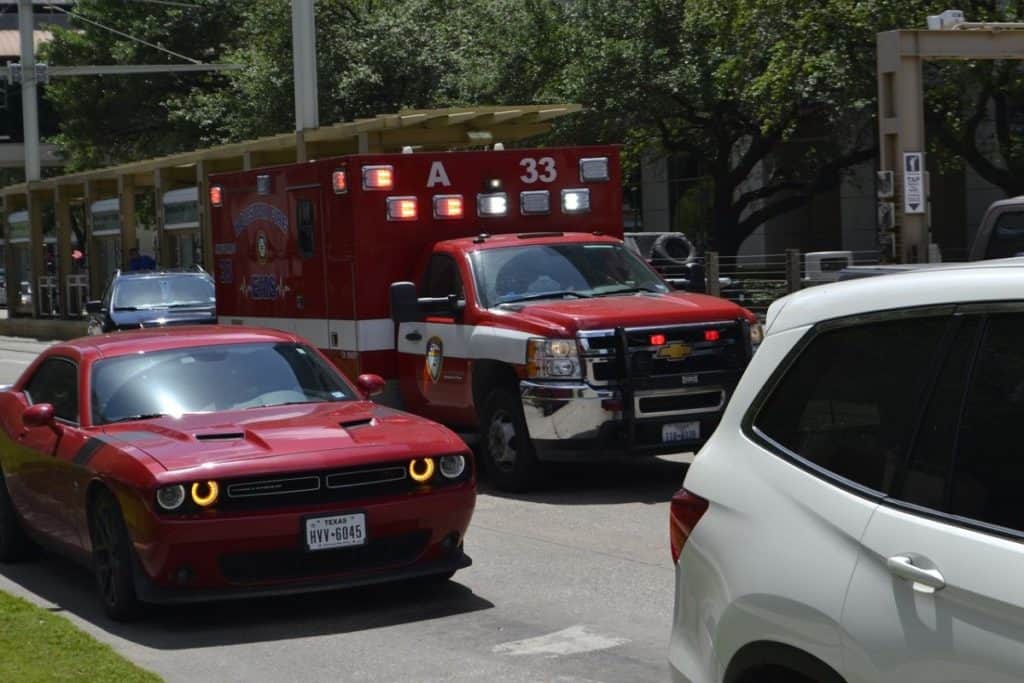We know the Emergency Medical Professionals like Paramedics and EMTs don’t work a normal 9-5 schedule. You may be wondering what kind of shifts you might work and whether this will have an impact on your health and happiness? That’s a sensible thing to research and there’s no doubt that adjusting to shift-work can be a challenge. So, we’ve got the lowdown on how EMTs work for you.
EMTs and Paramedics typically work either 8, 10, or 12 hour day or night shifts. They will usually work an average of 36 to 48 hours per week, plus overtime. There are less common schedules that use 24-hour or even 48-hour long workdays. The schedule will depend on the agency they work for.
Here’s what you’re going to need to know about shift working as an EMT or Paramedic. Lets take a look.
Your # 1 priority is keeping your family safe. As a firefighter, I recommend everyone has updated smoke detectors that don’t require battery changes, like these ones from Kidde, a fire extinguisher, like this one from Amerex, and a fire escape ladder if you have bedrooms above the first floor, I recommend this one from Hausse.
Also read: What Schedule Do Firefighters Work? Shift Schedules Examined
Emergency Medical Technician Work Hours

What are EMT hours? There is no standard work pattern for all EMTs. As you might expect your hours of work are likely to vary depending on the job you do and even where you do that job.
In general, most EMTs will work for employers that expect their EMT staff to be available around the clock because, unfortunately, emergencies don’t tend to keep to daylight hours and can happen at any time of the day or night.
And this also means that an EMT may end up working rather more than 40 hours a week to provide complete coverage on shifts. It’s not unknown for EMTs to work 50 or even 60 hours each week.
And sadly, for EMTs, when you’re off work, you may not be “off work”, most EMTs are expected to remain on call for at least a portion of their downtime in case there is a major emergency or other problem that leads to the employer having no cover for a shift. This will depend on your employer, work area, and contract.
Also read: How to Become an EMT: Expert Guide
What Is A Typical Schedule Like?
It depends on who you work for and what exactly it is that you will do as an EMT, it can also be dependent on where you live.
EMTs and Paramedics can work in a few different settings and that will affect the type of schedule worked.
If you live in a rural area, as a rule of thumb, you are more likely to be asked to follow 24-hour shift patterns than if you live in an urban area. But this can actually be a good thing, depending on the shifts you prefer.
We will share some example EMT schedules with you, but you should be aware that they can vary and your employer is not obliged to follow any shift pattern but their own.
Take a look:
Working on an Ambulance
Those working for private or public ambulance services can expect to work 12-hour shifts (think 7 a.m. to 7 p.m. or 7 p.m. to 7 a.m). This seems to be the most common.
This may be on a 4 days on, 3 days off basis, like this:
| Sun | Mon | Tues | Wed | Thur | Fri | Sat |
|---|---|---|---|---|---|---|
| 12 hours on | 12 hours on | 12 hours on | 12 hours on | Off | Off | Off |
Or a 4 day on, 4 day off rotation, like this:
| Sun | Mon | Tues | Wed | Thur | Fri | Sat |
|---|---|---|---|---|---|---|
| 12 hours on | 12 hours on | 12 hours on | 12 hours on | Off | Off | Off |
| Off | 12 hours on | 12 hours on | 12 hours on | 12 hours on | Off | Off |
You might also be expected to work a 24-hour shift. If you work 24-hour shifts you are normally given a minimum of 24 hours to recover before another shift and often, you’ll get 48 hours of downtime. There are a variety of 24 shift rotations.
The most common (24/48) looks like this (56 hour week average):
| Sun | Mon | Tues | Wed | Thur | Fri | Sat |
|---|---|---|---|---|---|---|
| 24 hours on | Off | Off | 24 hours on | Off | Off | 24 hours on |
| Off | Off | 24 hours on | Off | Off | 24 hours on | Off |
Ambulance companies sometimes require you to be on-call at times. Your employer might contact you at any time while off work to ask you to return to when they are short of staff. This also depends.
Working for a Fire Department
The Bureau of Labor Statistics pulls no punches when it says working for a Fire Department can be a hard job with a very unpredictable schedule.
EMTs and Paramedics that work for a Fire Department can work in two main roles.
- Firefighter/EMT or Firefighter/Paramedic
- Ambulance EMT or Paramedic
In the US, most firefighters are also trained and certified in Emergency medicine to the same level as those working on the ambulance.
They have the same EMT and Paramedic licenses and can perform all the same life-saving treatments. So we are really talking about firefighter schedules in this example.
However, some Fire Departments also operate their own emergency ambulance service that can transport sick or injured patients to the local hospital. They may be staffed with the same firefighters that work on the trucks and engines or they may have employers that are trained in EMS (Emergency Medical Services), but not in firefighting.

If that is the case, these Fire Department EMTs and Paramedics may work different shifts than the firefighters.
EMTs and Paramedics with fire departments typically end up working 48 to 56 hours a week and this can be in 8, 10, or even 24-hour shifts. They will usually get 48 hours off after working a full 24 hours, as we saw in the ambulance schedule above.
However, it’s worth noting that when big emergencies arise – an EMT with the fire department will be expected to extend their shift and keep working. This is called emergency overtime or mandatory callback.
For more detailed information on firefighter work schedules, read this article.
Working in a Hospital
If you want a semblance of normality when it comes to EMT shift work, then you may want to work in a hospital.
EMTs and Paramedics in hospitals tend to work 8- or 12-hour shifts as standard, though you may be still required to work nights.
A common EMT hospital schedule looks like this:
| Sun | Mon | Tues | Wed | Thur | Fri | Sat |
|---|---|---|---|---|---|---|
| 12 hours on | 12 hours on | Off | 12 hours on | Off | Off | Off |
Or like this with 8 hour shifts:
| Sun | Mon | Tues | Wed | Thur | Fri | Sat |
|---|---|---|---|---|---|---|
| 8 hours on | Off | 8 hours on | 8 hours on | Off | 8 hours on | Off |
You can see that in the hospital, an average week is usually closer to 36 hours.
Hospital schedules are can really vary and you will usually only be assigned your work days a month ahead of time.
So your schedule could look like this:
| Sun | Mon | Tues | Wed | Thur | Fri | Sat |
|---|---|---|---|---|---|---|
| 12 hours on | 12 hours on | Off | Off | Off | 12 hours on | Off |
| 12 hours on | Off | Off | Off | 12 hours on | Off | 12 hours on |
| 12 hours on | Off | 12 hours on | Off | 12 hours on | Off | Off |
| Off | 12 hours on | Off | Off | 12 hours on | 12 hours on | Off |
| Off | Off | 12 hours on | 12 hours on | Off | 12 hours on | Off |
These always changing schedules can be either good or bad as far as flexibility. It may make it easier to plan around your home life by picking days that work for you.
However, depending on staffing needs and your seniority (how long you have worked there) you may not get the shifts you want. This can make it hard to plan far ahead for things like vacations and other events.
There’s nothing easy or standard about the working life of Paramedics and EMTs when it comes to the hours they work, regardless of where they work.
Also read: Why Become An EMT? Is It The Right Job For You?
What’s the Best Schedule?
In normal practice EMTs work either 12 or 24 hour shifts most commonly.
This video talks about EMT schedules, but focusing on ambulance EMTs and Paramedics:
Surprisingly, most EMTs say that they prefer a 24-hour shift with 2 days off to any other. This is because, though there is a long day of work involved, there’s also plenty of recovery time afterward.
A 24-hour shift is a serious commitment and even though it is a popular option for both employers and EMTs alike it’s not without its risks.
There was a time when you could guarantee that an EMT on a 24-hour shift would get some (brief) periods of rest on a shift and they could sleep for a short while. This kept them from becoming fatigued on the job.
Now, with economic pressure on ambulance, fire and hospital services to be as efficient as possible, a 24-hour shift may involve 24 hours of continuous work.
This really depends on where you work and the call volume of that agency.
Despite the obvious stress that this may put on the EMT, they are expected to work professionally, politely, and productively throughout the shift even if they get no sleep.
As a Firefighter/Paramedic, I really like our current 48/96 work schedule. It is a big improvement to other types of schedules I have worked in the past.
Also read: The Difference Between EMT And Paramedic?
How Flexible Are EMT Hours?
There may or may not be some ability to negotiate your shift pattern with your employer and you might be able to swap a shift here and there with a colleague.
EMT hours are not very flexible. You are expected to remain at work throughout your shift and may be required to work overtime at any point.
You will usually be allowed to trade shifts when needed. You also should get some type of leave allowance for sick, vacation time off. Again, this varies.
When you are “on call” you must respond to the call and report for duty immediately.
Also read: What Is It Like to Date a Firefighter? What You Should Know
Is Shift Work Dangerous To Your Health?
EMT and Paramedic shifts can be bad for your health, but that will depend on a variety of factors.
The exact understanding of how fatigue impacts on people is still being unearthed but there’s no doubt that going without sleep creates stress on your body and mind and may lead to ill-health.
EMS World has been calling for a re-evaluation of shift patterns in the industry to ensure that EMTs get appropriate levels of rest. They note that in 1910 the average worker got 9 hours of sleep a night and now it’s more like 6.3!
If you are interested in the details and science of how sleep deprivation and other negatives of shift work can affect your health, read this, this, this, this, and this.
Also read: Is EMT A Dangerous Job? Risks and Challenges
How Many Hours Do You Work a Week/Month?
A Paramedic or EMT will usually work 36 to 56-hours per week, depending on their employer’s staffing needs.
The difference between working 36 hours in a week and 56 (or more with overtime) is pretty big. This really depends on the type of shifts you work and the amount of calls you are running.
This means working between 162 to 252 hours per month.
In reality, it is common for paramedics to work more hours than this and in total, a paramedic works over 2,880 hours a year and then they do overtime on top of that.
As with EMTs, employers expect large amounts of flexibility from paramedics who may be asked to be on call when not working and to extend their shifts at any time.
Related Articles
What Jobs Can You Get With An EMT Certification? 11 Jobs

